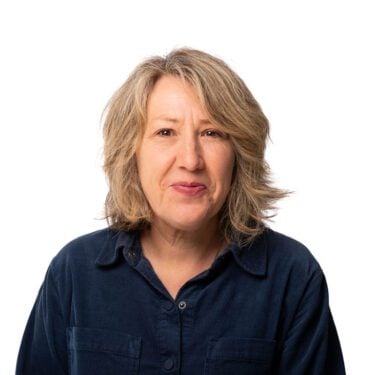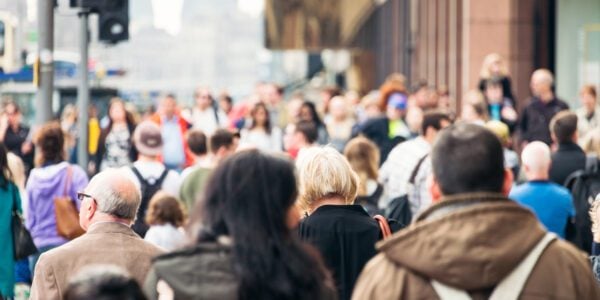

24/01/22
5 min read
In partnership with Versus Arthritis, we are calling for applications to our Oliver Bird Fund. Our goal is to fund research that will improve the social and economic well-being of people living with musculoskeletal conditions. Catherine Dennison, lead for the Fund, spoke with Colin Wilkinson, Research Partner with Versus Arthritis, to explore why this is a crucial area, and the response we hope to receive from the social science community.
Over 20 million people in the UK are living with a musculoskeletal (MSK) condition, such as arthritis and low back pain. MSK conditions account for up to one in three GP consultations and over 28 million working days were lost due to MSK conditions in 2019. These are sobering statistics, however they only hint at the lived experience of people with these life-altering conditions. Although developments in treatments have brought significant benefits in enabling people to manage their conditions, they still face many challenges.
Our new call for applications to the Oliver Bird Fund is focused on how quality of life might be improved through research to identify policy and practice developments that can be made in areas such as education, employment, social care and community settings, and how ethnic, gender and income inequalities might increase adverse impacts. My conversation with Colin Wilkinson, one of a growing number of people with lived experience of MSK conditions who contribute to Versus Arthritis’s research programme, brought home how all-encompassing the impacts can be. As well as sharing his own experiences, Colin reflected on why research supported by the Fund needs to effectively involve people living with MSK conditions.
Now in his forties, Colin first developed signs of an MSK condition aged 18. This was followed by tough years of relapse and remission, struggling to get a full diagnosis and effective treatment when nothing worked, and being told by his bosses that he was ‘too young’ to have arthritis.
Earning a living with an MSK condition
Having reached the position of senior manager in Higher Education, with a team of 40 people, Colin took the decision to move to self-employment at the end of a project contract. This gave him the flexibility to work at times to suit himself, to work around his very painful condition and to attend the complex series of medical and therapeutic appointments. He reflected that it would need a hugely understanding employer to accommodate ‘perpetual absences for appointments and recovery from treatments such as steroid injections, which I was having four or five times a year’. Fortunately, knowing that he had a strong reputation and network of contacts gave him confidence to set up his own business.
Colin explained that remaining in work was hugely important to him, enabling him to continue to contribute to society. Understanding his capacity for work, as well as other commitments, is a major shift that takes ongoing psychological adjustment. More recently, in reaction to his deteriorating condition after a medical accident, Colin had to close his business, and now works solely as a public contributor to health research and policy, in a very limited way.
Adjusting to day-to-day life
Colin went on to tell me about the impact his MSK condition had on other aspects of his life. He needed to make the ‘no brainer’ move from his three-storey house to a bungalow, which has been fitted with grab rails, an adapted bathroom, low threshold doors and additional steps to reduce step height. He needs to employ a cleaner and has redesigned his garden to enable him to continue working in it without it being overwhelming.
Colin shared his regret about having to sacrifice involvement in leisure activities he was passionate about, and how the limits on his energy levels – that change by the hour – prevent him from being the son, neighbour, and uncle he would like to be. In a desire to stay active, Colin resists using a mobility scooter, but uses a wheeled walker instead, and is often frustrated by inaccessible venues. He spoke of the constant challenges of navigating the health system, with long gaps between appointments, and no psychological support to learn how to adapt to his shifting condition. Colin summarises his current position:
‘My underlying arthritis had already robbed me of many of my favourite pastimes – hillwalking, building upland footpaths, conservation work and making music to name but a few. After the medical accident, which gave me septic arthritis and now a replaced hip, I have been robbed of what was left of my career and left in worse pain. I’m on even more medication that has profound effects on every area of my life, from sleep to sex and earning to eating, and need psychological help to stop yelling at people without reason or freezing when something that reminds me of my experiences is mentioned.’
In managing to negotiate ongoing challenges Colin credits his own social, health and science capital, recognising that people without similar economic and emotional resources face significant difficulties, such as accessing and retaining disability benefits. He notes that those with caring responsibilities, such as for young children, have additional struggles:
‘I still consider myself lucky. I often think how it must be for the mother who develops rheumatoid arthritis in her 20s and who can no longer pick up her young child when it cries, because it hurts too much. What happens when her child’s boundless energy comes up against its mother’s pain? Any physical pain the mother feels is only multiplied by the anguish of not being able to comfort her child or explain why she can’t get involved in the child’s activities.’
‘My story is one of many, and I know it’s not typical. Most people don’t have to endure medical accidents, people have other conditions, from low back pain to Sjogren’s and Lupus, and Still’s Disease and many more. All of these conditions can be devastating, and we need research into all of them, and to adapt services so they fit everyone, as flexibly as possible, over the whole of their lives, from those who have these conditions in childhood, to those who get or still have them in much later life.’
How research can help
Colin is optimistic about the value of a wide range of research to enabling those with MSK conditions to thrive. He works closely with Versus Arthritis to inform their commissioning of research, as co-chair of the Fellowship Expert Committee. We discussed his goal for researchers to recognise the valuable contribution those with MSK conditions can make:
You cannot research these conditions successfully unless people with these conditions work with you every single step of the way.Colin Wilkinson
This collaborative approach will bring important insights such as awareness of the fluctuating nature of inflammatory arthritis, and the all-consuming impact of fatigue. Colin strongly believes researchers need to find ways to genuinely share power by involving people living with MSK conditions in decision-making at all stages.
‘I don’t care what you call it, co-production, involvement, engagement, whatever, but unless researchers share power over their research from the very start with people like me, and make decisions collaboratively with people like me, and with clinicians if possible, my personal view is that they shouldn’t get funding.’
Applying to the Oliver Bird Fund
The Oliver Bird Fund welcomes proposals for quantitative, qualitative or mixed method projects from a range of disciplines or multi-disciplinary teams. Proposals should focus on how MSK conditions relate to social and economic outcomes across the life course, what puts people at particular risk of negative impacts, and how these might be mitigated through improvements in policy and practice.
For all projects, we stipulate that applicants should ‘propose how they will meaningfully involve people living with, affected by, or at risk of, musculoskeletal conditions, and those supporting or treating them, across the project’. Alongside academics and policy makers, people with MSK conditions will be involved in our assessment of funding applications. We will consider the importance of the proposed research question, rigour of the methods, plans for involving those with lived experience, and routes to impact. The final word, however, should go to Colin:
We want to see ambitious proposals that have the potential to make a real difference to people’s lives, and that demonstrate how the research will contribute to making that difference.Colin Wilkinson
About the authors
Catherine joined the Nuffield Foundation’s Welfare team in early 2019, contributing to the development, and management of the grants portfolio. She leads on our digital society grants and manages our Oliver Bird programme of research relating to the impact of musculoskeletal conditions on wider well-being. She has co-ordinated the COVID-19 rapid response call.
Prior to joining the Nuffield Foundation, Catherine managed Research and Policy teams with the sight loss charity RNIB. Previously she worked in the Department of Health as Research Manager with the Children and Young People’s Public Health and Teenage Pregnancy policy teams.
 Colin Wilkinson
Colin Wilkinson
Colin Wilkinson is a science communicator who worked to support science teachers in schools across North East England for 20 years. Colin was also heavily involved in the UK Young Scientist and Engineer of the Year Competition from 2010-2018, acting as overall chair of judges in 2017 and 2018. Colin chairs the Fellowship Expert Committee for Versus Arthritis, the Phenomics for People Steering Group for HDR UK and the CRIISP Consortium Public Advisory Group for the University of Bath. CRIISP is a £4M consortium researching psychosocial mechanisms of pain as part of the Advanced Pain Discovery Platform. Colin is also involved in a wide range of other public involvement activities, including NICE Guideline Committees and NHS England work on chronic pain.
Colin developed joint-related symptoms in 1994, diagnosed as psoriatic arthritis in 2014. He subsequently developed steroid-induced osteoporosis, psoriasis, asthma and a range of other conditions. After a medical accident in 2018, Colin stopped working with schools and now has a limited number of roles in public involvement.





















































